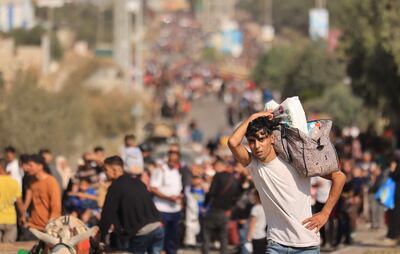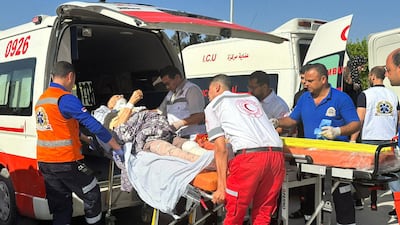Live updates: Follow the latest news on Israel-Gaza
With shadow operators, former intelligence agents, conflict negotiators and risk-assessment teams on the ground, private security firms are assembling their best resources to help evacuate people trapped in the Israel-Gaza war.
Many companies are hiring private operators to ensure the safe movement of their employees across and within the borders of Israel, Gaza and Lebanon as aerial bombings, urban warfare, cross-border missile attacks and border closures are escalating the decades-long conflict.
Iran-allied Hezbollah in Lebanon and Houthis in Yemen have also been striking Israeli targets, fuelling fears of a spillover of violence to the wider region and heightening security risks.
International SOS, a security and risk management company with operations in more than 90 countries, said it has helped enable the movement of at least 200 people around the region, as well as assisting “hundreds more” with information and advice on safety.
Sally Llewellyn, global security director of International SOS, told The National the company has supported a number of safe movements out of the occupied West Bank, which has been a flashpoint of violence between the Israeli citizens and Palestinians since the beginning of the conflict.
“Since the start of the conflict, we have done 11 different missions to help people leave the country by flying out of the Ben Gurion Airport in Israel,” she said.
That includes people from a range of nationalities – Palestinian, Israeli, dual nationals, foreign citizens and also people with medical conditions.
“They were extremely difficult to do given that movement in and out of West Bank is highly restricted,” she said.
The majority of International SOS’s clients are corporates, aid providers and media companies which have operations in the region.
The October 7 Hamas attack on Israel, the following retaliatory assault on Gaza and a war now in its second month without a ceasefire, has caused one of the biggest civilian death tolls in the decades-long Israeli-Palestinian conflict.
About 1,400 Israelis were killed by Hamas, while the death toll in Gaza has crossed 10,500.
The scale of Hamas's attack followed by the full-blown Israeli military bombardment has raised the possibility of a wider regional conflict, prompting many countries to issue warnings to citizens to leave Lebanon, Israel and Palestine.
Several commercial airlines have responded to the crisis by suspending flights, leaving people who stayed behind or could not leave with very few options.
Regular risk assessment
The sudden shift in the security landscape in the region caught many by surprise. But Ms Llewellyn said they were prepared as they continuously monitor security situations around the world and routinely plan for crisis control.
“We had sent a team on the ground in Israeli and Palestinian territories back in July to assess the situation and reaffirm our capabilities, as well as our review of our existing partnerships with our security partners on the ground,” she said.
So, when the situation escalated after October 7, International SOS and its partners on the ground were armed with crucial information that helped evacuate their clients through air and by sea.
“When a lot of commercial aviation options became restricted, we were able to offer chartered flights, as well as work on maritime options,” said Ms Llewellyn.
For land movements within the borders, the firm counted on security and risk-assessment teams on the ground to advise on which routes to take and which checkpoints to cross, especially in the West Bank.
Many security firms team up with private security personnel on the ground that have a thorough understanding of the security landscape of a particular country.
“Private security is a common sort of industry in these types of environments,“ said Ms Llewellyn. "And they could employ a whole range of types of personnel with different backgrounds."
Many are war veterans with previous experience of working in hostile environments.
Previously, several companies hired private security firms to evacuate their employees out of Afghanistan, Sudan and Ukraine. Companies such as International SOS and Control Risks were involved in facilitating the safe movement of people across the border to Europe from Ukraine, and to Port Sudan during the height of the civil war in Sudan.
'Gaza the most challenging environment'
But Gaza is a different ball game and poses an extremely challenging environment for security firms as borders are crossed and movement by road is risky.
Rafah crossing under Egypt’s control, the only exit point for Palestinians trapped in Gaza where an Israeli siege has left its 2.3 million people without food, water and fuel, remains closed, with limited access for aid flow.
Though intense diplomatic efforts recently have seen a few foreign nationalities and people with medical conditions cross into Egypt, thousands including American citizens are still trapped in the war-ravaged Gaza Strip.
Simon Margrave, a partner with Control Risks, a crisis and security consulting company with global operations told The National it has been offering advice to clients in Gaza.
“We have been speaking to clients, who have people in Gaza, on what are the best options they have to keep themselves safe.”
Mr Margrave said the company was offering logistical assistance and advising on the type of provisions to stock up on, for instance candles, batteries or baby formula.
It is a highly volatile and challenging environment
Simon Margrave,
partner at Control Risks
Taking the land journey to the Rafah crossing has been one of the biggest challenges for civilians as it involves dodging Israeli air strikes and bullets.
Mr Margrave is advising clients on safe shelter options such as staying in lower floors of hardened structures and keeping a "grab bag" ready for a move.
“It is a highly volatile and challenging environment,” he said. "We are working with our partners to offer daily risk assessment and advising on all window of opportunities available for our clients, including which government agencies to co-ordinate with, be it in Gaza, Israel or Lebanon.
For those people who are able to cross over to Egypt, security firms are offering logistical and medical assistance, as well as psychological support, which is needed in many cases. Lodgings and tickets are also offered depending on where the next destination or stopover is.
Anghami
Started: December 2011
Co-founders: Elie Habib, Eddy Maroun
Based: Beirut and Dubai
Sector: Entertainment
Size: 85 employees
Stage: Series C
Investors: MEVP, du, Mobily, MBC, Samena Capital
Sonchiriya
Director: Abhishek Chaubey
Producer: RSVP Movies, Azure Entertainment
Cast: Sushant Singh Rajput, Manoj Bajpayee, Ashutosh Rana, Bhumi Pednekar, Ranvir Shorey
Rating: 3/5
KEY%20DATES%20IN%20AMAZON'S%20HISTORY
%3Cp%3E%3Cstrong%3EJuly%205%2C%201994%3A%3C%2Fstrong%3E%20Jeff%20Bezos%20founds%20Cadabra%20Inc%2C%20which%20would%20later%20be%20renamed%20to%20Amazon.com%2C%20because%20his%20lawyer%20misheard%20the%20name%20as%20'cadaver'.%20In%20its%20earliest%20days%2C%20the%20bookstore%20operated%20out%20of%20a%20rented%20garage%20in%20Bellevue%2C%20Washington%3C%2Fp%3E%0A%3Cp%3E%3Cstrong%3EJuly%2016%2C%201995%3A%3C%2Fstrong%3E%20Amazon%20formally%20opens%20as%20an%20online%20bookseller.%20%3Cem%3EFluid%20Concepts%20and%20Creative%20Analogies%3A%20Computer%20Models%20of%20the%20Fundamental%20Mechanisms%20of%20Thought%3C%2Fem%3E%20becomes%20the%20first%20item%20sold%20on%20Amazon%3C%2Fp%3E%0A%3Cp%3E%3Cstrong%3E1997%3A%3C%2Fstrong%3E%20Amazon%20goes%20public%20at%20%2418%20a%20share%2C%20which%20has%20grown%20about%201%2C000%20per%20cent%20at%20present.%20Its%20highest%20closing%20price%20was%20%24197.85%20on%20June%2027%2C%202024%3C%2Fp%3E%0A%3Cp%3E%3Cstrong%3E1998%3A%3C%2Fstrong%3E%20Amazon%20acquires%20IMDb%2C%20its%20first%20major%20acquisition.%20It%20also%20starts%20selling%20CDs%20and%20DVDs%3C%2Fp%3E%0A%3Cp%3E%3Cstrong%3E2000%3A%3C%2Fstrong%3E%20Amazon%20Marketplace%20opens%2C%20allowing%20people%20to%20sell%20items%20on%20the%20website%3C%2Fp%3E%0A%3Cp%3E%3Cstrong%3E2002%3A%3C%2Fstrong%3E%20Amazon%20forms%20what%20would%20become%20Amazon%20Web%20Services%2C%20opening%20the%20Amazon.com%20platform%20to%20all%20developers.%20The%20cloud%20unit%20would%20follow%20in%202006%3C%2Fp%3E%0A%3Cp%3E%3Cstrong%3E2003%3A%3C%2Fstrong%3E%20Amazon%20turns%20in%20an%20annual%20profit%20of%20%2475%20million%2C%20the%20first%20time%20it%20ended%20a%20year%20in%20the%20black%3C%2Fp%3E%0A%3Cp%3E%3Cstrong%3E2005%3A%3C%2Fstrong%3E%20Amazon%20Prime%20is%20introduced%2C%20its%20first-ever%20subscription%20service%20that%20offered%20US%20customers%20free%20two-day%20shipping%20for%20%2479%20a%20year%3C%2Fp%3E%0A%3Cp%3E%3Cstrong%3E2006%3A%3C%2Fstrong%3E%20Amazon%20Unbox%20is%20unveiled%2C%20the%20company's%20video%20service%20that%20would%20later%20morph%20into%20Amazon%20Instant%20Video%20and%2C%20ultimately%2C%20Amazon%20Video%3C%2Fp%3E%0A%3Cp%3E%3Cstrong%3E2007%3A%3C%2Fstrong%3E%20Amazon's%20first%20hardware%20product%2C%20the%20Kindle%20e-reader%2C%20is%20introduced%3B%20the%20Fire%20TV%20and%20Fire%20Phone%20would%20come%20in%202014.%20Grocery%20service%20Amazon%20Fresh%20is%20also%20started%3C%2Fp%3E%0A%3Cp%3E%3Cstrong%3E2009%3A%3C%2Fstrong%3E%20Amazon%20introduces%20Amazon%20Basics%2C%20its%20in-house%20label%20for%20a%20variety%20of%20products%3C%2Fp%3E%0A%3Cp%3E%3Cstrong%3E2010%3A%3C%2Fstrong%3E%20The%20foundations%20for%20Amazon%20Studios%20were%20laid.%20Its%20first%20original%20streaming%20content%20debuted%20in%202013%3C%2Fp%3E%0A%3Cp%3E%3Cstrong%3E2011%3A%3C%2Fstrong%3E%20The%20Amazon%20Appstore%20for%20Google's%20Android%20is%20launched.%20It%20is%20still%20unavailable%20on%20Apple's%20iOS%3C%2Fp%3E%0A%3Cp%3E%3Cstrong%3E2014%3A%3C%2Fstrong%3E%20The%20Amazon%20Echo%20is%20launched%2C%20a%20speaker%20that%20acts%20as%20a%20personal%20digital%20assistant%20powered%20by%20Alexa%3C%2Fp%3E%0A%3Cp%3E%3Cstrong%3E2017%3A%3C%2Fstrong%3E%20Amazon%20acquires%20Whole%20Foods%20for%20%2413.7%20billion%2C%20its%20biggest%20acquisition%3C%2Fp%3E%0A%3Cp%3E%3Cstrong%3E2018%3A%3C%2Fstrong%3E%20Amazon's%20market%20cap%20briefly%20crosses%20the%20%241%20trillion%20mark%2C%20making%20it%2C%20at%20the%20time%2C%20only%20the%20third%20company%20to%20achieve%20that%20milestone%3C%2Fp%3E%0A
What%20is%20cystic%20fibrosis%3F
%3Cul%3E%0A%3Cli%3ECystic%20fibrosis%20is%20a%20genetic%20disorder%20that%20affects%20the%20lungs%2C%20pancreas%20and%20other%20organs.%3C%2Fli%3E%0A%3Cli%3EIt%20causes%20the%20production%20of%20thick%2C%20sticky%20mucus%20that%20can%20clog%20the%20airways%20and%20lead%20to%20severe%20respiratory%20and%20digestive%20problems.%3C%2Fli%3E%0A%3Cli%3EPatients%20with%20the%20condition%20are%20prone%20to%20lung%20infections%20and%20often%20suffer%20from%20chronic%20coughing%2C%20wheezing%20and%20shortness%20of%20breath.%3C%2Fli%3E%0A%3Cli%3ELife%20expectancy%20for%20sufferers%20of%20cystic%20fibrosis%20is%20now%20around%2050%20years.%3C%2Fli%3E%0A%3C%2Ful%3E%0A
Traits of Chinese zodiac animals
Tiger:independent, successful, volatile
Rat:witty, creative, charming
Ox:diligent, perseverent, conservative
Rabbit:gracious, considerate, sensitive
Dragon:prosperous, brave, rash
Snake:calm, thoughtful, stubborn
Horse:faithful, energetic, carefree
Sheep:easy-going, peacemaker, curious
Monkey:family-orientated, clever, playful
Rooster:honest, confident, pompous
Dog:loyal, kind, perfectionist
Boar:loving, tolerant, indulgent
Lexus LX700h specs
Engine: 3.4-litre twin-turbo V6 plus supplementary electric motor
Power: 464hp at 5,200rpm
Torque: 790Nm from 2,000-3,600rpm
Transmission: 10-speed auto
Fuel consumption: 11.7L/100km
On sale: Now
Price: From Dh590,000
England squads for Test and T20 series against New Zealand
Test squad: Joe Root (capt), Jofra Archer, Stuart Broad, Rory Burns, Jos Buttler, Zak Crawley, Sam Curran, Joe Denly, Jack Leach, Saqib Mahmood, Matthew Parkinson, Ollie Pope, Dominic Sibley, Ben Stokes, Chris Woakes
T20 squad: Eoin Morgan (capt), Jonny Bairstow, Tom Banton, Sam Billings, Pat Brown, Sam Curran, Tom Curran, Joe Denly, Lewis Gregory, Chris Jordan, Saqib Mahmood, Dawid Malan, Matt Parkinson, Adil Rashid, James Vince
England squad
Goalkeepers: Jordan Pickford, Nick Pope, Aaron Ramsdale
Defenders: Trent Alexander-Arnold, Conor Coady, Marc Guehi, Reece James, Harry Maguire, Tyrone Mings, Luke Shaw, John Stones, Ben White
Midfielders: Jude Bellingham, Conor Gallagher, Mason Mount, Jordan Henderson, Declan Rice, James Ward-Prowse
Forwards: Tammy Abraham, Phil Foden, Jack Grealish, Harry Kane, Bukayo Saka, Emile Smith Rowe, Raheem Sterling
More Expo 2020 Dubai pavilions:
Real estate tokenisation project
Dubai launched the pilot phase of its real estate tokenisation project last month.
The initiative focuses on converting real estate assets into digital tokens recorded on blockchain technology and helps in streamlining the process of buying, selling and investing, the Dubai Land Department said.
Dubai’s real estate tokenisation market is projected to reach Dh60 billion ($16.33 billion) by 2033, representing 7 per cent of the emirate’s total property transactions, according to the DLD.
UEFA CHAMPIONS LEAGUE FIXTURES
All kick-off times 10.45pm UAE ( 4 GMT) unless stated
Tuesday
Sevilla v Maribor
Spartak Moscow v Liverpool
Manchester City v Shakhtar Donetsk
Napoli v Feyenoord
Besiktas v RB Leipzig
Monaco v Porto
Apoel Nicosia v Tottenham Hotspur
Borussia Dortmund v Real Madrid
Wednesday
Basel v Benfica
CSKA Moscow Manchester United
Paris Saint-Germain v Bayern Munich
Anderlecht v Celtic
Qarabag v Roma (8pm)
Atletico Madrid v Chelsea
Juventus v Olympiakos
Sporting Lisbon v Barcelona
UAE SQUAD FOR ASIAN JIU-JITSU CHAMPIONSHIP
Men’s squad: Faisal Al Ketbi, Omar Al Fadhli, Zayed Al Kathiri, Thiab Al Nuaimi, Khaled Al Shehhi, Mohamed Ali Al Suwaidi, Farraj Khaled Al Awlaqi, Muhammad Al Ameri, Mahdi Al Awlaqi, Saeed Al Qubaisi, Abdullah Al Qubaisi and Hazaa Farhan
Women's squad: Hamda Al Shekheili, Shouq Al Dhanhani, Balqis Abdullah, Sharifa Al Namani, Asma Al Hosani, Maitha Sultan, Bashayer Al Matrooshi, Maha Al Hanaei, Shamma Al Kalbani, Haya Al Jahuri, Mahra Mahfouz, Marwa Al Hosani, Tasneem Al Jahoori and Maryam Al Amri
Tom Fletcher on 'soft power'
Anxiety and work stress major factors
Anxiety, work stress and social isolation are all factors in the recogised rise in mental health problems.
A study UAE Ministry of Health researchers published in the summer also cited struggles with weight and illnesses as major contributors.
Its authors analysed a dozen separate UAE studies between 2007 and 2017. Prevalence was often higher in university students, women and in people on low incomes.
One showed 28 per cent of female students at a Dubai university reported symptoms linked to depression. Another in Al Ain found 22.2 per cent of students had depressive symptoms - five times the global average.
It said the country has made strides to address mental health problems but said: “Our review highlights the overall prevalence of depressive symptoms and depression, which may long have been overlooked."
Prof Samir Al Adawi, of the department of behavioural medicine at Sultan Qaboos University in Oman, who was not involved in the study but is a recognised expert in the Gulf, said how mental health is discussed varies significantly between cultures and nationalities.
“The problem we have in the Gulf is the cross-cultural differences and how people articulate emotional distress," said Prof Al Adawi.
“Someone will say that I have physical complaints rather than emotional complaints. This is the major problem with any discussion around depression."
Daniel Bardsley
The Sand Castle
Director: Matty Brown
Stars: Nadine Labaki, Ziad Bakri, Zain Al Rafeea, Riman Al Rafeea
Rating: 2.5/5
Company%C2%A0profile
%3Cp%3E%3Cstrong%3EName%3A%20%3C%2Fstrong%3EPyppl%3C%2Fp%3E%0A%3Cp%3E%3Cstrong%3EEstablished%3A%20%3C%2Fstrong%3E2017%3C%2Fp%3E%0A%3Cp%3E%3Cstrong%3EFounders%3A%20%3C%2Fstrong%3EAntti%20Arponen%20and%20Phil%20Reynolds%26nbsp%3B%3C%2Fp%3E%0A%3Cp%3E%3Cstrong%3EBased%3A%3C%2Fstrong%3E%20UAE%3C%2Fp%3E%0A%3Cp%3E%3Cstrong%3ESector%3A%3C%2Fstrong%3E%20financial%20services%3C%2Fp%3E%0A%3Cp%3E%3Cstrong%3EInvestment%3A%3C%2Fstrong%3E%20%2418.5%20million%3C%2Fp%3E%0A%3Cp%3E%3Cstrong%3EEmployees%3A%3C%2Fstrong%3E%20150%3C%2Fp%3E%0A%3Cp%3E%3Cstrong%3EFunding%20stage%3A%3C%2Fstrong%3E%20series%20A%2C%20closed%20in%202021%3C%2Fp%3E%0A%3Cp%3E%3Cstrong%3EInvestors%3A%3C%2Fstrong%3E%20venture%20capital%20companies%2C%20international%20funds%2C%20family%20offices%2C%20high-net-worth%20individuals%3C%2Fp%3E%0A
EMERGENCY PHONE NUMBERS
Estijaba – 8001717 – number to call to request coronavirus testing
Ministry of Health and Prevention – 80011111
Dubai Health Authority – 800342 – The number to book a free video or voice consultation with a doctor or connect to a local health centre
Emirates airline – 600555555
Etihad Airways – 600555666
Ambulance – 998
Knowledge and Human Development Authority – 8005432 ext. 4 for Covid-19 queries













